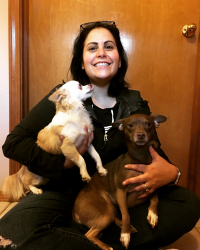

Ovarian cancer has taken a lot from me. Most painfully at this point is that it has taken my fertility. But, ovarian cancer has also given me a mission and the resolve to share my story, because if I can save just one other woman, my own experience will at least feel worthwhile.
Here’s my ovarian cancer story: my husband and I wanted to have children so we visited our fertility doctor who sent me to do a Pap Smear with my primary doctor as part of our initial testing. I was not due for a Pap Smear and had never had an abnormal one, so I wasn’t worried. I figured our infertility issues would have nothing to do with me. I was 36 and my mom had given birth to my little sister at 44 years old, so I felt I had plenty of time to have kids.
The Pap Smear was on a Friday in July of 2017 and by Sunday my husband and I were off visiting my parents in a remote area where phone service was not reliable. I first knew something was wrong when we drove into town on Monday and I had a missed call from my doctor’s office asking that I call back immediately. We kept playing phone tag, and by Thursday when I had my primary doctor on the phone I was finally able to convince her that nothing could be gained by telling me news in person. I was already worrying myself sick and I was sitting down with my husband by my side.
She said they found ovarian cancer cells on my cervix, and I would need to be seen by a gynecologist oncologist. We had already ordered an ultrasound and we put in the request for a CT scan. I was in shock. I later learned that you cannot be diagnosed without a biopsy. When I was back from vacation I meet with my gynecologist oncologist. He wanted to rule out cervical cancer so we did a procedure called a cone biopsy, which confirmed I did not have cervical cancer. Next was a biopsy. The plan was to remove one of my Fallopian tubes and one ovary to test for ovarian cancer while I was in surgery. When my gyn onc and his team opened me up (abdominally, from my pelvis to above my belly button) they did a biopsy and discovered I had Stage IIIC serous low-grade ovarian cancer. My ovaries had displaced my other organs (my bladder was flat as a pancake) which had to be repositioned and the cancer had spread to both ovaries, the lining of my abdomen and was in the fluids in my abdomen. Following my doctor’s recommendation, my husband and sister made the decision that my ovaries, Fallopian tubes, uterus, cervix be removed and tumors debulked. My doctor let them know that my ovaries were doing me no good, and that no reputable fertility doctor would try to get eggs out of them. The surgery ended up lasting four hours. When I came to, my sister and husband were on each side of my bed. I asked them to tell me what happened, and they did. I thanked them for making such a tough decision. After my recovery, it was recommended that I start chemo. I had learned that low-grade ovarian cancer doesn’t typically respond well to chemo, so I decided to seek out a second opinion from one of the top low-grade ovarian cancer doctors. He let me know that some patients where having luck with Letrozole, a maintenance drug. Some patients did chemo, some did partial chemo, and some went straight on the drug after tumor debulking. I decided to skip chemo and go straight on Letrozole.
Less than six months went by before I had muscle strain pain in my abdomen and extreme fatigue. My gynecologist oncologist ordered a C125 blood test and a CT scan, and did a physical exam. All three tests confirmed a recurrence. An abdominal surgery was performed on March 8th, 2018. It was a four and ½ hour procedure that involved the removal of two tumors, my appendix, and included the resection of my bowels. I am now recovering at home, and will soon learn the next steps in my treatment.
It is so important to know symptoms of ovarian cancer and risk factors. I had symptoms of ovarian cancer. If I had known then what I know now, I would have asked for a CT scan when I first experienced symptoms of frequent urination, fatigue, bloating, and abdominal pain. I wouldn’t have been quiet about my symptoms, nor would I have thought they were a normal part of being a woman!
Editor’s Note: Sayla is a 2018 Advocate Leader for the Ovarian Cancer Research Fund Alliance. She recently flew to Washington DC to train as an advocate and where she met with staff of the Oregon congressional delegation on Capitol Hill. Sayla shared her story and asked for support for legislation that funds research on ovarian cancer. Sayla lives in Portland. Her pups are Penny and Peanut.
